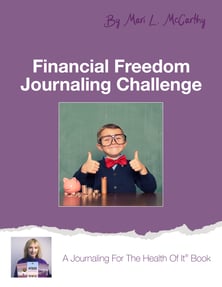When it comes to financial freedom, many people aren’t aware of the impact stress can have on achieving this goal. While it may be easy to see the impact finances have on stress, the opposite is often a little trickier to see. But stress can have a huge impact on financial freedom, both in the short and long run.
Today, I'm discussing some of the ways stress can affect your financial decisions and how it can impact your overall financial freedom. I'll also discuss some tips for reducing stress so you can make better money decisions and achieve financial freedom sooner rather than later!
How Stress Impacts Your Finances
Financial decisions are often made based on emotion, which can lead to impulsive spending. When you're feeling stressed, it's easy to fall into the trap of buying things you don't need or can't afford, just to make yourself feel better in the moment. This can quickly put a dent in your savings and set you back on your journey to financial freedom.
In addition to impulsive spending, stress can lead to other financial decision-making mistakes, such as not saving enough for retirement, taking on too much debt, and making risky investments. When you're stressed about money, it's easy to focus on immediate needs and forget about long-term goals like retirement. This can have serious consequences down the road, so it's important to make sure you're still contributing to your savings even when times are tough.
Stress can also lead to poor money management and make it more difficult to stay on top of bills and other financial obligations. This can cause you to rely heavily on credit cards or take out loans, which can put you in a cycle of debt that's hard to break free from.
When you're feeling stressed about money, it's easy to get caught up in the idea of making a quick profit. This can lead you to make rash decisions about investments and taking on more risk than you can afford.
So, what can you do to improve your financial situation when you’re stressed?
Ways to Reduce Impulse Purchases
The best way to reduce stress-related financial mistakes is to take a step back and assess your situation before making any decisions. If you're feeling overwhelmed by financial stress, sit down and make a list of your priorities. Write down what you need to pay for each month and what can wait until later. This will help you focus on what's truly important and prevent you from impulse buying.
Rather than purchasing items on impulse, create a wish list of items you'd like to buy in the future. This will give you something to look forward to purchasing when times aren’t so tough. When you get the urge to spend money, add the item to your wish list. This will help curb impulse spending and ensure you only spend money on things you truly want or need.
You’ve probably heard the expression, “Sleep on it.” Your wish list will come in handy for this too. Write your item on your list, then take a look at your list the next day to see if you still feel like buying whatever it is you wrote down. Take a deep breath and relax before making any financial decisions. If you're feeling stressed, it's often best to wait a day or two more before making a purchase. This will give you time to think about whether you really need or just want the item and how it will impact your financial situation.
Try to avoid making financial decisions when you're feeling emotional. This will help you think more clearly and make better choices for your financial future.
More Tools for Managing Stress
If you find that financial stress is impacting your ability to make sound decisions, there are a few tools and resources that can help. First, consider talking to a financial advisor. They can help you objectively assess your situation and create a plan to reduce stress and improve your financial wellbeing.
There are also many helpful books and articles on the topic of financial stress. Reading about how others have coped with financial difficulties can give you some great ideas for managing your own stress. Many free apps and websites offer tips for reducing stress and improving financial health. Take some time to explore what's available and find the resources that work best for you.
Financial freedom matters because it gives us choices. It allows us to live the life we want to live. But financial freedom can be hard to achieve if we're constantly stressed about money. The good news is there are ways to reduce stress and make better financial decisions. By taking a step back, making a list of priorities, and reading about financial stress, you can take control of your finances and improve your financial wellbeing.
Below you will find some of my favorite tools for managing stress—affirmations and journal prompts.
Affirmations
The purpose of affirmations is creating new beliefs around how you feel about money. You may want to edit the affirmations below to fit your own beliefs better.
- I am in control of my financial future.
- I make wise financial decisions.
- I consider my purchases carefully before taking action.
- I am stress-free and financially free.
The more you use affirmations, the better they work, so choose the ones you like best and repeat them often throughout the day.
Journal Prompts
Writing in your journal is a great way to reduce stress, especially stress around money. Here are some journal prompts designed to get you thinking about the impact of stress on your financial freedom.
What are some of the financial decisions you've made that have caused you stress?
It may seem counterintuitive to relive stressful financial decisions, but writing them in your journal gives you a chance to get them out of your head. You can finally stop reliving them over and over and find a way to move on and start fresh.
By understanding your financial situation and what has caused you stress, you can create a plan to reduce the stress and improve your financial wellbeing going forward.
What are your current financial priorities?
Write down what you need to pay for each month and what can wait until later. This will help you focus on what's truly important and prevent you from impulse buying. When you get the urge to spend money, add the item to your wish list and give yourself some time to think about whether you really need that item now or whether you can wait until later to purchase it.
How has stress impacted your financial decisions in the past? What part would you like stress to play in your financial decisions going forward?
It’s not always possible to make financial decisions without feeling stressed or overly emotional. If your emotions are running high, try taking a deep breath and relaxing before making any financial decisions. Write about any emotionally charged financial situations you’ve experienced as well as how you’d ideally like to make financial decisions going forward.
In Conclusion
Stress can have a major impact on our financial wellbeing. But by taking some time to assess our priorities and make smart financial decisions, as well as using tools like wish lists, affirmations and journaling, we can reduce stress and achieve financial freedom. All the best on your financial journey!
***************************************
For more journaling prompts like these, check out the Financial Freedom Journaling Challenge where you'll learn how to let go of money blocks and work towards your ideal financial future.
Financial freedom is something that means different things to different people. For some, it might mean being debt-free. For others, it might mean having enough money saved for a rainy day. No matter what financial freedom means to you, it's important to start working towards it today. You'd be surprised at how far small steps will take you on the road to your financial goals.
Use the coupon code WHOLEHEALTH50 and receive 50% off on your purchase today

Author bio: Michelle Cornish is the author of Prosperity Planner: Manage Your Personal Finances and Get Out of Debt, an undated planner where she shares more about her personal financial journey and her TREE Method for keeping her personal finances in check.





Leave Comment